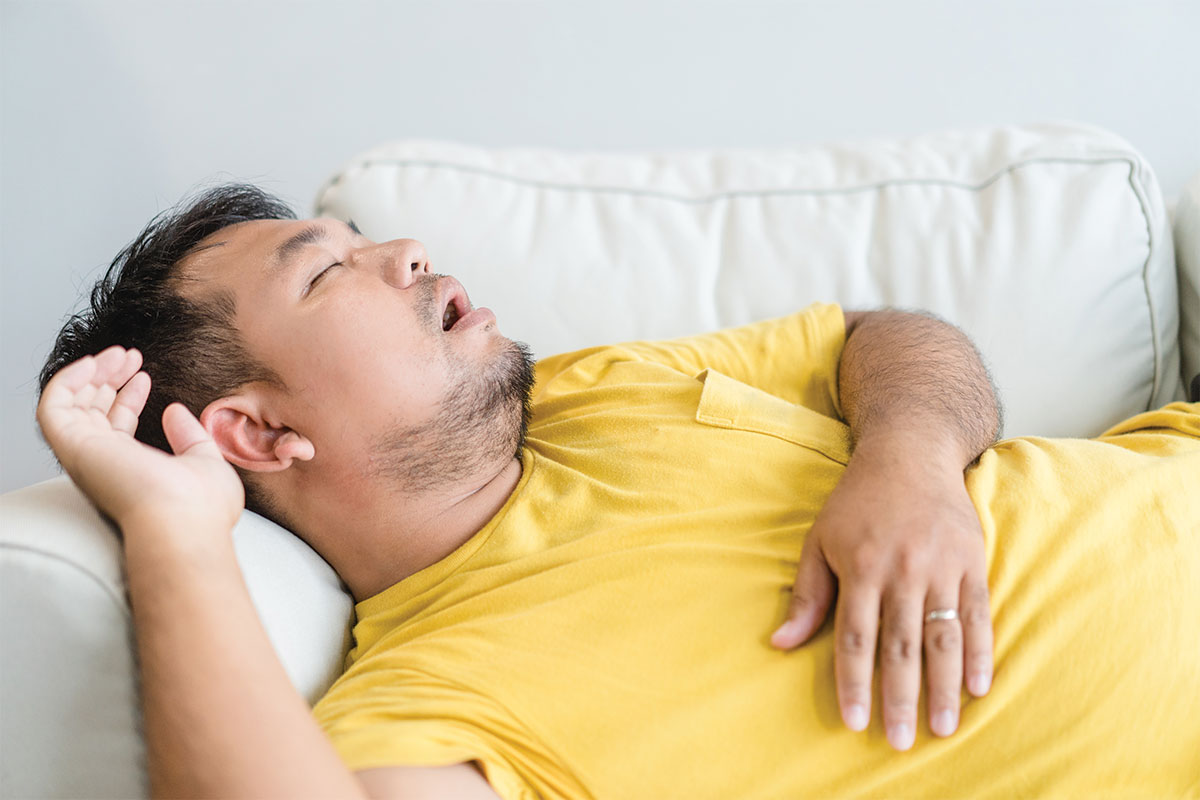
Snoring is an extremely common issue that has a variety of causes. While the mechanism of snoring is much the same for most people, the actual reason why different people snore varies. The question of “why do people snore?” does not necessarily have a simple answer.
What is snoring? It is the harsh, guttural sound of breathing some people make when they are asleep. Much more than heavy or deep breathing, it can be very disruptive both to the person who snores as well as their sleep partner, and even other household members. While almost all of us will snore occasionally, many people snore chronically and it can be both a cause and a result of serious medical conditions.
Why do people snore?
What is the Physical Cause of Snoring? The physical cause of snoring itself is quite simple and is generally the same for most snorers. Snoring occurs because the muscles and other tissues of the airways relax too much, and narrow or collapse and the flow of air during breathing becomes obstructed.
The tissues involved in snoring include:
- The tongue
- The soft palate
- The uvula
- The nasopharynx
- The throat (oropharynx and hypopharynx)
Due to the relaxation of the airways (and this occurs for a variety of reasons), the airways through the mouth and throat become narrower or, in some cases, partially or even completely blocked. As the person breathes in, the tissues vibrate and “rattle”. This is the sound of snoring. In more severe cases, the snorer may choke and gasp for breath, and this disrupts their sleep.
Why Does Snoring Affect Some People More Than Others?
There is a variety of reasons why people snore, and why snoring affects some people more than others. From genetics to lifestyle, medical conditions to sleeping position, snoring is an issue that should be assessed and addressed.
Some factors which impact the likelihood and severity of snoring include:
- Genetics – if your parents habitually snore, you too are statistically more likely to snore.
- Body Weight – being overweight or obese has a direct impact on your likelihood of being a snorer. This is due to an array of factors including possible poor lifestyle choices, poor muscle tone and condition of the head and neck, and lack of exercise. People who are very overweight are also more prone to developing obstructive sleep apnoea.
- Neck Circumference – common in people who are overweight, an increased neck circumference due to higher fat deposits in the neck directly impacts the tissues of the airways and their likelihood of narrowing or collapsing.
- Anatomy – anatomical issues which can result in snoring include enlarged tonsils and/or adenoids, a deviated septum, an enlarged tongue, an enlarged or overly “floppy” uvula, sinus issues, and more.
- Sleeping Position – people who sleep on their back are far more likely to snore. For many people, simple altering their habitual sleeping position off the back is enough to prevent snoring.
- A Blocked Nose – having a blocked nose for any reason increases the likelihood of mouth breathing and snoring. This can be caused by anatomical issues, allergies, having an upper respiratory tract infection, sinusitis, irritation or inflammation from dust, perfumes, or a variety of other causes. Antihistamines and decongestants may help.
- Obstructive Sleep Apnoea (OSA) – this is a serious medical condition that causes the sleeper to stop breathing many times every night. Snoring is simply a consequence and symptom of this disorder. OSA must be diagnosed properly and treated by a doctor or medical sleep specialist. The most common treatment includes using a CPAP machine during sleep. If you suspect you may suffer from sleep apnoea, you must make an appointment to see your doctor promptly.
- Being Overtired – simply being overtired can cause the muscles of the head and neck to overrelax and lead to snoring.
- Lifestyle – your lifestyle plays a role in snoring. Factors that may lead to snoring include lack of exercise, poor dietary choices, eating a large meal at night, eating too close to bedtime, dehydration, cigarette smoking, illicit drug use, sedative use, napping during the day, and many more.
Factors That Impact The Ways People Snore
As well as having different causes, there are different types of snoring:
- Nasal Snoring – occurs due to narrowed nasal passages and breathing through the nose. This may result from allergies, viral illnesses, a deviated septum, sinus issues, or inflammation from cigarette smoking or passive smoking. It sounds like a grunt or a loud whistle and can cause headaches and halitosis (bad breath).
- Mouth Snoring – usually occurs in people who have blocked nasal passages and thus breathe through their mouth. It can also occur due to enlarged tonsils or weak tissues in the soft palate and only occurs when sleeping with the mouth open.
- Tongue Snoring – due to vibration of the tongue. This occurs when the tongue relaxes too much or falls back into the airway while sleeping on the back. It is common in people who consume alcohol, use sedatives, or who carry excess fat in their neck. It only occurs when sleeping on the back and sufferers may have an enlarged tongue. It features inconsistent, high-pitched sounds.
- Throat Snoring – the loudest type of snoring and the most medically significant. This type of snoring requires medical assessment and attention and could signify obstructive sleep apnoea. Throat snoring occurs regardless of sleep position and as a result of the soft tissues and muscles in the throat relaxing too much and collapsing to block the airway. Untreated throat snoring can lead to high blood pressure, type 2 diabetes, and other chronic health conditions.
Discover SnoreMD
Understanding why you snore is the first step to addressing the causes and, where possible, making some positive changes to alleviate (or eliminate) the problem.
SnoreMD is the Australian brand of a medically proven anti-snoring device that is used by men and women of all ages worldwide. Worn in the mouth during sleep, SnoreMD is a comfortable mandibular adjustment device that gently repositions the lower jaw. This helps to open the airways and enable smoother, snore-free breathing. Biomedically engineered, SnoreMD has been manufactured to the highest Australian standards and is suitable for use by everyone over the age of 18 years. It is widely recommended by doctors, pharmacists, and sleep specialists. It has no negative side effects and, unlike a lot of other commercial snoring solutions, SnoreMD will not disrupt your sleep or that of your partner.


